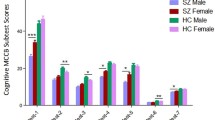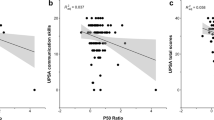Abstract
A large number of studies have reported that sensory gating disorders represented by P50 inhibition may be involved in the pathophysiological process of schizophrenia. However, few studies have explored the relationship between sensory gating disorders and cognitive dysfunction in patients with schizophrenia. This study aimed to explore sex differences in the relationship between cognitive and P50 deficits in patients with chronic schizophrenia, which has not been reported. A total of 183 chronic schizophrenia patients (128 males and 55 females) and 166 healthy controls (76 males and 90 females) participated in this study. The MATRICS Consensus Cognitive Battery (MCCB) was measured for cognitive function and P50 components for the sensory gating in all participants. The Positive and Negative Syndrome Scales (PANSS) was used to assess the psychopathological symptoms in patients. Female patients performed significantly better than male patients in several cognitive domains of MCCB (all p < 0.01). There were no significant differences in P50 components between male and female patients (all p > 0.05). Further analysis showed that in female patients, latency of S2 was negatively correlated with reasoning and problem-solving domain of MCCB (p < 0.05), and P50 ratio was negatively correlated with social cognition domain of MCCB (p < 0.05). In male patients, there was no any correlation between P50 and cognitive domains of MCCB. Our results suggest that there is a sex difference in the association between P50 deficiency and cognitive impairment in Chinese Han patients with schizophrenia.

Similar content being viewed by others
Data availability
The data that support the findings of this study are available on request from the corresponding author.
References
Barch DM, Carter CS, Arnsten A, Buchanan RW, Cohen JD, Geyer M et al (2009) Selecting paradigms from cognitive neuroscience for translation into use in clinical trials: proceedings of the third CNTRICS meeting. Schizophr Bull 35:109–114
Beauchet O (2006) Testosterone and cognitive function: current clinical evidence of a relationship. Eur J Endocrinol 155:773–781
Chang Q, Liu M, Tian Q, Wang H, Luo Y, Zhang J et al (2019) EEG-based brain functional connectivity in first-episode schizophrenia patients, ultra-high-risk individuals, and healthy controls during P50 suppression. Front Hum Neurosci 13:379
Cui JF, Zou YZ, Li Y, Wang J, Chen N, Fan HZ et al (2009) Reliability and validity of brief assessment of cognition in schizophrenia. Chin Ment Health J 03
Dalecki A, Green AE, Johnstone SJ, Croft RJ (2016) The relevance of attention in schizophrenia P50 paired stimulus studies. Clin Neurophysiol 127:2448–2454
Falkenburg J, Tracy DK (2014) Sex and schizophrenia: a review of gender differences. Psychosis 6:61–69
Galderisi S, Mucci A, Dollfus S, Nordentoft M, Falkai P, Kaiser S et al (2021) EPA guidance on assessment of negative symptoms in schizophrenia. Eur Psychiatry 64:e23
Galderisi S, Rucci P, Mucci A, Rossi A, Rocca P, Bertolino A et al (2020) The interplay among psychopathology, personal resources, context-related factors and real-life functioning in schizophrenia: stability in relationships after 4 years and differences in network structure between recovered and non-recovered patients. World Psychiatry 19:81–91
Giordano GM, Perrottelli A, Mucci A, Di Lorenzo G, Altamura M, Bellomo A et al (2021) Investigating the relationships of P3b with negative symptoms and neurocognition in subjects with chronic schizophrenia. Brain Sci 11
Green MF, Nuechterlein KH, Gold JM, Barch DM, Cohen J, Essock S et al (2004) Approaching a consensus cognitive battery for clinical trials in schizophrenia: the NIMH-MATRICS conference to select cognitive domains and test criteria. Biol Psychiatry 56:301–307
Gurvich C, Gavrilidis E, Worsley R, Hadaib A, Thomas N, Kulkarni J (2018) Menstrual cycle irregularity and menopause status influence cognition in women with schizophrenia. Psychoneuroendocrinology 96:173–178
Hamling KR, Schoppik D (2018) Sensory gating: cellular substrates of surprise. Curr Biol 28:R871–R873
Hong X, Chan RC, Zhuang X, Jiang T, Wan X, Wang J et al (2009) Neuroleptic effects on P50 sensory gating in patients with first-episode never-medicated schizophrenia. Schizophr Res 108:151–157
Hoonakker M, Doignon-Camus N, Bonnefond A (2017) Sustaining attention to simple visual tasks: a central deficit in schizophrenia? A systematic review. Ann N Y Acad Sci 1408:32–45
Hsieh MH, Lin YT, Chien YL, Hwang TJ, Hwu HG, Liu CM et al (2019) Auditory event-related potentials in antipsychotic-free subjects with ultra-high-risk state and first-episode psychosis. Front Psychiatry 10:223
Janowsky JS (2006) The role of androgens in cognition and brain aging in men. Neuroscience 138:1015–1020
Jasinska AJ, Zorick T, Brody AL, Stein EA (2014) Dual role of nicotine in addiction and cognition: a review of neuroimaging studies in humans. Neuropharmacology 84:111–122
Kanchanatawan B, Hemrungrojn S, Thika S, Sirivichayakul S, Ruxrungtham K, Carvalho AF et al (2018) Changes in tryptophan catabolite (TRYCAT) pathway patterning are associated with mild impairments in declarative memory in schizophrenia and deficits in semantic and episodic memory coupled with increased false-memory creation in deficit schizophrenia. Mol Neurobiol 55:5184–5201
Kay SR, Fiszbein A, Opler LA (1986) The positive and negative syndrome scale (PANSS) for schizophrenia. Schizophr Bull 13:261
Kern RS, Nuechterlein KH, Green MF, Baade LE, Fenton WS, Gold JM et al (2008) The MATRICS Consensus Cognitive Battery, part 2: co-norming and standardization. Am J Psychiatry 165:214–220
Lei Y, Ozdemir RA, Perez MA (2018) Gating of sensory input at subcortical and cortical levels during grasping in humans. J Neurosci 38:7237–7247
Mendrek A, Mancini-Marïe A (2016) Sex/gender differences in the brain and cognition in schizophrenia. Neurosci Biobehav Rev 67:57–78
Mu L, Liang J, Wang H, Chen D, Xiu M, Zhang XY (2020) Sex differences in association between clinical correlates and cognitive impairment in patients with chronic schizophrenia. J Psychiatr Res 131:194–202
Neu P, Gooren T, Niebuhr U, Schlattmann P (2019) Cognitive impairment in schizophrenia and depression: a comparison of stability and course. Appl Neuropsychol Adult 26:215–228
Nuechterlein KH, Green MF, Kern RS, Baade LE, Barch DM, Cohen JD et al (2008) The MATRICS Consensus Cognitive Battery, part 1: test selection, reliability, and validity. Am J Psychiatry 165:203–213
Paquin K, Wilson AL, Cellard C, Lecomte T, Potvin S (2014) A systematic review on improving cognition in schizophrenia: which is the more commonly used type of training, practice or strategy learning? BMC Psychiatry 14:139
Patterson JV, Hetrick WP, Boutros NN, Jin Y, Sandman C, Stern H et al (2008) P50 sensory gating ratios in schizophrenics and controls: a review and data analysis. Psychiatry Res 158:226–247
Quigley H, MacCabe JH (2019) The relationship between nicotine and psychosis. Ther Adv Psychopharmacol 9:2045125319859969
Riecher-Rössler A, Häfner H (2010) Gender aspects in schizophrenia: bridging the border between social and biological psychiatry. Acta Psychiatr Scand Suppl 102:58–62
Rubin LH, Carter CS, Drogos L, Jamadar R, Pournajafi-Nazarloo H, Sweeney JA et al (2011) Sex-specific associations between peripheral oxytocin and emotion perception in schizophrenia. Schizophr Res 130:266–270
Rubin LH, Haas GL, Keshavan MS, Sweeney JA, Maki PM (2008) Sex difference in cognitive response to antipsychotic treatment in first episode schizophrenia. Neuropsychopharmacology 33:290–297
Sánchezmorla EM, Santos JL, Aparicio A, Garcíajiménez MÁ, Soria C, Arango C (2013) Neuropsychological correlates of P50 sensory gating in patients with schizophrenia. Schizophr Res 143:102–106
Schubring D, Popov T, Miller GA, Rockstroh B (2018) Consistency of abnormal sensory gating in first-admission and chronic schizophrenia across quantification methods. Psychophysiology 55.
Seeman MV (2012) Menstrual exacerbation of schizophrenia symptoms. Acta Psychiatr Scand 125:363–371
Smelror RE, Johannessen C, Wedervang-Resell K, Jørgensen KN, Barth C, Andreou D et al (2021) Cognitive impairment profile in adolescent early-onset psychosis using the MATRICS Battery: age and sex effects. Neuropsychology 35:300–309
Strassnig M, Bowie C, Pinkham AE, Penn D, Twamley EW, Patterson TL et al (2018) Which levels of cognitive impairments and negative symptoms are related to functional deficits in schizophrenia? J Psychiatr Res 104:124–129
Tan SP, Jie-Feng C, Fan FM, Zhao YL, Chen N, Fan HZ et al (2014) Smoking, MATRICS consensus cognitive battery and P50 sensory gating in a Han Chinese population. Drug Alcohol Depend 143:51–57
Thwaites SJ, van den Buuse M, Gogos A (2014) Differential effects of estrogen and testosterone on auditory sensory gating in rats. Psychopharmacology 231:243–256
Toyomaki A, Hashimoto N, Kako Y, Tomimatsu Y, Koyama T, Kusumi I (2015) Different P50 sensory gating measures reflect different cognitive dysfunctions in schizophrenia. Schizophr Res Cogn 2:166–169
Vita A, Gaebel W, Mucci A, Sachs G, Erfurth A, Barlati S et al (2022) European Psychiatric Association guidance on assessment of cognitive impairment in schizophrenia. Eur Psychiatry 65:e58
Wallwork RS, Fortgang R, Hashimoto R, Weinberger DR, Dickinson D (2012) Searching for a consensus five-factor model of the Positive and Negative Syndrome Scale for schizophrenia. Schizophr Res 137:246–250
Wang DM, Xia LY, Zhou HX, Tian Y, Dai QL, Xiu MH et al (2023) Smoking affects the association between cognitive impairment and P50 inhibition defects in patients with chronic schizophrenia: a case-control study. Asian J Psychiatr 79:103391
Wu JQ, Chen DC, Tan YL, Xiu MH, De Yang F, Soares JC et al (2016) Cognitive impairments in first-episode drug-naive and chronic medicated schizophrenia: MATRICS consensus cognitive battery in a Chinese Han population. Psychiatry Res 238:196–202
Xia L, Wang D, Wang J, Xu H, Huo L, Tian Y et al (2020a) Association of cognitive and P50 suppression deficits in chronic patients with schizophrenia. Clin Neurophysiol 131:725–733
Xia L, Yuan L, Du XD, Wang D, Wang J, Xu H et al (2020b) P50 inhibition deficit in patients with chronic schizophrenia: relationship with cognitive impairment of MATRICS consensus cognitive battery. Schizophr Res 215:105–112
Xia L, Liu L, Hong X, Wang D, Wei G, Wang J et al (2020c) One-day tropisetron treatment improves cognitive deficits and P50 inhibition deficits in schizophrenia. Neuropsychopharmacology 45(8):1362–1368
Žakić MD, Milas G (2019) Working memory in patients with schizophrenia and bipolar affective disorder: quantitative or qualitative differences? Psychiatr Danub 31:54–61
Zhang B, Han M, Tan S, De Yang F, Tan Y, Jiang S et al (2017) Gender differences measured by the MATRICS consensus cognitive battery in chronic schizophrenia patients. Sci Rep 7:11821
Zhang XY, Chen DC, Tan YL, Tan SP, Wang ZR, Yang FD et al (2014) Gender difference in association of cognition with BDNF in chronic schizophrenia. Psychoneuroendocrinology 48:136–146
Zhang XY, Chen DC, Xiu MH, Yang FD, Haile CN, Kosten TA et al (2012) Gender differences in never-medicated first-episode schizophrenia and medicated chronic schizophrenia patients. J Clin Psychiatry 73:1025–1033
Zhao N, Wang XH, Kang CY, Zheng Y, Yang LY, Guan TF et al (2021) Sex differences in association between cognitive impairment and clinical correlates in Chinese patients with first-episode drug-naïve schizophrenia. Ann Gen Psychiatry 20:26
Zhu XL, Tan SP, Wang ZR, Zhang JG, Li D, Fan FM et al (2017) P50 suppression deficits and psychopathology in Han Chinese patients with schizophrenia. Neurosci Lett 653:346–350
Funding
This study was funded by the CAS International Cooperation Research Program (153111KYSB20190004), the CAS Pioneer Hundred Talents Program and the CAS Key Lab of Mental Health. These sources had no further role in this study design, in the data collection and analysis, in the writing of the report and in the decision to submit the paper for publication.
Author information
Authors and Affiliations
Corresponding author
Ethics declarations
Ethics approval
The research protocol was approved by the Institutional Review Board (IRB), Beijing Hui-Long-Guan hospital. Participants who were willing to participate in our study signed a written informed consent. The authors assert that all procedures contributing to this work comply with the ethical standards of the relevant national and institutional committees on human experimentation and with the Helsinki Declaration of 1975, as revised in 2008.
Competing interests
The authors declare no competing interests.
Additional information
Publisher's Note
Springer Nature remains neutral with regard to jurisdictional claims in published maps and institutional affiliations.
Rights and permissions
Springer Nature or its licensor (e.g. a society or other partner) holds exclusive rights to this article under a publishing agreement with the author(s) or other rightsholder(s); author self-archiving of the accepted manuscript version of this article is solely governed by the terms of such publishing agreement and applicable law.
About this article
Cite this article
Wang, D., Xia, L., Zhang, Z. et al. Sex difference in association between cognitive and P50 deficits in patients with chronic schizophrenia. Arch Womens Ment Health 26, 793–801 (2023). https://doi.org/10.1007/s00737-023-01367-4
Received:
Accepted:
Published:
Issue Date:
DOI: https://doi.org/10.1007/s00737-023-01367-4




